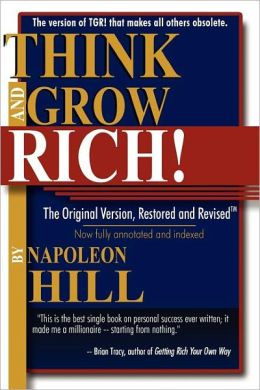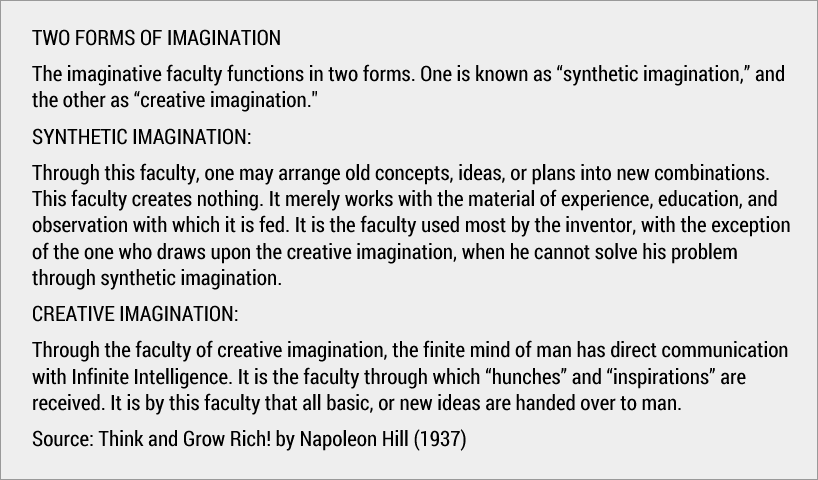I have read many books detailing the creative process and Think and Grow Rich! is one of the best.
Do not be put off by the title or the exclamation mark. Its potential value to newcreators is immense.

Think and Grow Rich! was written by Napoleon Hill in 1937 and promoted as a personal development and self-improvement book. He claimed to be inspired by a suggestion from business magnate and later-philanthropist Andrew Carnegie. First published during the Great Depression, the book has sold more than 15 million copies. It remains the biggest seller of Napoleon Hill’s books. BusinessWeek magazine’s Best-Seller List ranked it the sixth best-selling paperback business book 70 years after it was published. Think and Grow Rich is listed in John C. Maxwell’s A Lifetime “Must Read” Books List. While the book’s title and much of the writing concerns increasing income, the author insists that his philosophy can help people succeed in any line of work, to do and be anything they can imagine.
Wikipedia — Think and Grow Rich.
Napoleon Hill
What’s in the book?
The text of Think and Grow Rich! is founded on Hill’s earlier work The Law of Success (1925 — download pdf), the result of more than twenty years of research based on Hill’s close association with a large number of individuals who achieved great wealth during their lifetimes including the industrialist and philanthropist Andrew Carnegie.Napoleon Hill’s philosophy had its formal beginning in 1908, when Carnegie offered him the opportunity to interview the most powerful men of his day in order to learn the secrets of their success. Hill studied the characteristics of these achievers and developed 16 (later 17) principles that can be applied by anybody to achieve success in their lives and in any field of endeavour.
Think and Grow Rich! condenses these principles further and provides the reader with 13 principles in the form of a philosophy of personal achievement. It is noted in the book that an individual with desire, faith and persistence can reach great heights by eliminating all negative energy and thoughts and focusing at the greater goals in hand.
The 13 principles are listed below, each being a chapter title.
- Desire
- Faith
- Autosuggestion
- Specialized Knowledge
- Imagination
- Organized Planning
- Decision
- Persistence
- Power of the Master Mind 1
- The Mystery of Sex Transmutation
- The Subconscious Mind
- The Brain
- The Sixth Sense
1. The Master Mind may be defined as “Coordination of knowledge and effort, in a spirit of harmony, between two or more people, for the attainment of a definite purpose.”
In Think and Grow Rich!, Napoleon Hill writes about a faculty he calls synthetic imagination, whereby existing ideas are combined to create a new one. (Today, this approach is called combinatorial creativity.) He contrasts synthetic imagination with creative imagination, through which truly original ideas are conceived.Riches cannot always be measured in money!
Money and material things are essential for freedom of body and mind, but there are some who will feel that the greatest of all riches can be evaluated only in terms of lasting friendships, harmonious family relationships, sympathy and understanding between business associates, and introspective harmony which brings one peace of mind measurable only in spiritual values!
Think and Grow Rich! by Napoleon Hill, 1938 edition published by The Ralston Society, Meriden, Conn., USA

In place of creative imagination I have adopted the term pure imagining for the following reasons:
- Both forms of imagination could be considered creative.
- The contrast with synthetic imagination is stronger.
- Imagination is an abstract noun, a no-thing, whereas imagining is a verb, an activity.
- Pure imagining signifies a co-creative partnership with intent (aka Infinite Intelligence, spirit, Creative Action etc. — view list of synonyms and related terms).
Infinite Intelligence
There comes to your aid, and to do your bidding, with the development of the sixth sense, a “guardian angel” who will open to you at all times the door to the Temple of Wisdom.
Whether or not this is a statement of truth, you will never know, except by following the instructions described in the pages of this book, or some similar method of procedure.
The author is not a believer in, nor an advocate of “miracles,” for the reason that he has enough knowledge of Nature to understand that Nature never deviates from her established laws.
Some of her laws are so incomprehensible that they produce what appear to be “miracles.” The sixth sense comes as near to being a miracle as anything I have ever experienced, and it appears so, only because I do not understand the method by which this principle is operated.
This much the author does know – that there is a power, or a First Cause, or an Intelligence, which permeates every atom of matter, and embraces every unit of energy perceptible to man – that this Infinite Intelligence converts acorns into oak trees, causes water to flow downhill in response to the law of gravity, follows night with day, and winter with summer, each maintaining its proper place and relationship to the other. This Intelligence may, through the principles of this philosophy, be induced to aid in transmuting DESIRES into concrete, or material form. The author has this knowledge, because he has experimented with it – and has EXPERIENCED IT.
Napoleon Hill, Think and Grow Rich! Chapter 14
Infinite Intelligence has a similar meaning to Edward Matchett’s media and Carlos Castaneda’s intent.“Infinite Intelligence” is the term Hill uses to describe “God,” or “Divine Power,” or the “Supreme Being” at work in the universe and whose influence is felt everywhere within it. His conception of God, or Infinite Intelligence, is richly textured and multi-faceted. God, to Hill, is more than a divinely spiritual, personal, moral force. God is a source of intelligence, direct communication, and exchange of information—between the Supreme Intelligence itself and the individual, and even between individuals. It is clear that Hill writes primarily from a Judeo-Christian perspective, but his view of Infinite Intelligence is nonsectarian and widely encompassing. As you read the book, notice how Hill sees Infinite Intelligence at work in the lives of Jesus, Gandhi, and Mohammed, as well as in all individuals whose mental states are “attuned” to the power of Infinite Intelligence. Hill is never “preachy” about Infinite Intelligence and how one should respond to it, but to fully understand and utilize The Think and Grow Rich Philosophy, it is necessary to understand the part that Infinite Intelligence—God—plays in it.
Ross Cornwell, Endnotes, Think and Grow Rich! The Original Version, Restored and Revised | Download link below
View a list of synonyms and related terms
There’s also this, from Nick Cave (view source):
I am inclined to believe in a form of intelligence within the universe, as I hold that consciousness or ‘intelligence’ exists throughout everything, that it goes all the way down to the fundamental atomic matter of things. This force, woven into everything – both living and non-living – is inherently good. If we choose, we could call this force God.
The secret
Author Napoleon Hill refers to a “secret” that runs throughout his 1937 self-help book Think and Grow Rich. This secret, he writes, appears at least once in every chapter. But he does not specifically name the secret. […] The “secret” of Think and Grow Rich is to place yourself within the overall scheme of creation, obeying natural laws that inevitably and invariably beget growth, expansion, renewal, and generativity.
Source: Mitch Horowitz, The Secret of “Think and Grow Rich”, on Medium (members only)
Obtain a copy of Think and Grow Rich!
The Original Version, Restored and Revised, with Revisions, a Special Foreword and Annotations by Ross Cornwell
When ordering Think and Grow Rich! please ensure that it is this version.Order from Amazon UK (this is not an affiliate link)
Alternatively you can download a pdf copy here, although it is not the version mentioned above.
You can also download the book as an editable Word document here, courtesy of Doug Keesler.
Continue reading
Synthetic imagination and pure imagining
Search the site
Not case sensitive. Do not to hit return.
